2012 年上海普通高中会考英语真题及答案
Listening comprehension: (共 10 分)
I.
Section A (共 6 分,每小题 2 分)
Directions: In Section A, you will hear one short passage, and you will be asked
three questions on the passages. The passage will be read twice, but the questions
will be spoken only once. When you hear a question, read the four possible answers
on your paper and decide which one would be the best answer to the question you
have heard.
Questions 1 through 3 are based on the following passage:
1. A. Watch TV in the evening.
B. Use the toilet inside the house.
D. Wash their hair with shampoo.
C. Cook food themselves.
2. A. She felt completely bad about it.
B. She thought life in the house was
easy.
C. She enjoyed everything there.
D. She preferred to live a modern life.
3. A. An old house.
B. A happy family.
C. A popular TV program.
D. A modern lifestyle.
Section B: (共 4 分,每小题 1 分)
Directions: In Section B, you will hear one conversation. The conversation will
be read twice. After you hear the conversation, you are required to fill in the
numbered blanks with the information you have heard. Write your answers on your
answer sheet.
Blanks 4 through 7 are based on the following conversation:
Complete the form . Write ONE WORD for each blank.
Hotel Registration Form
Name:
Room number:
Room type:
Length of stay:
Means of payment:
Special needs:
Alan Jones
429
_________4_______
Three nights
By _______5________
● A
● A
___6________
call
wake-up
at
__7___
II. Grammar and Vocabulary: (共 30 分)
Section A: (共 10 分,每小题 1 分)
8. In her short story, Helen described not her own experience, but ______ writer’
s.
A. the others
B. another
C. other
D. others
9. As an English learner, the larger vocabulary you have, _____ success you may
achieve.
�
A. the most
B. the more
C. more
D. most
10. Since his arrival in England in 1979, he ______ himself as a mayor.
A. established
B. had established
C. has established
D.
was
establishing
11. Some birds have highly developed senses that enable them _______ in the dark.
A. fly
B. to be flying
C. to fly
D. flying
12. You mustn’t smoke in here! You _____ start a fire.
A. could
B. must
C. should
D. need
13. I could hardly imagine _________ in such a remote mountain village for months.
A. to live
B. live
C. living
D. to have lived
14. That’s the man _______ photo is on the cover of the latest magazine.
A. that
B. who
C. where
D. whose
15. It is the Internet ______ keeps us in constant touch with our offices in Asia.
A. that
B. who
C. where
D. how
16. The newly retired engineer is starting his further education ______ my father
did last year.
A. if
B. when
C. once
D. as
17. They have passed the law, but the question is _____ they’re going to make the
law work.
A. why
C. what
B. how
D. that
Section B (共 10 分, 每小题 1 分)
Directions: Read the text below. Use the word in the brackets to form a word that
fits in the space.
I use the Internet all the time, and I think it’s fantastic. But there is one
thing I would be more ___18___ (care) about doing in future. That’s booking a
vacation online.
I needed a vacation from work ____19___ (bad), so I decided to take a short
break. I looked up some hotels on the Internet and found what looked like a great
place for holidays. The pictures on the website looked ____20____ (amaze): sandy
beaches, little houses that looked out over the sea, beachside dining; it was just
what I needed. I went ahead and made a ____21____ (reserve) over the Internet. It
was easy. Or so it seemed.
When I got the hotel, I was shocked. The staff was rude and ___22___ (friendly).
My house was old, in need of repair and was nowhere near the beach. To top it all
of, the view of that __23___ (gold) sandy beach was nowhere to be seen.
If you are thinking of booking a holiday over the Internet, take my ___24___
(advise). Always be sure to call the hotel first and talk to the people before you
reserve it. Also, check out some ___25___ (independence) websites that can give
you __26___ (accuracy) information about the area you’ll be staying in. Tourist
association sites are the ___27__ (good) . If you’re still unsure, don’t book.
If you can’t find what you’re looking for on the Net, book your vacation the
old-fashioned way ----- go visit a travel agency!
�
Section C (共 10 分,每小题 1 分)
Directions: For each blank in the following passage, there are four words or phrases
marked A, B, C and D. Fill in each blank with the word or phrase that best fits
the context.
Do you love to go shopping, but seem to spend all your hard-earned cash on just
one or two items? If so, why __28___ hunting around for cheaper, second-hand options?
With a little time and patience, it’s possible to find some great ___29___ . Take
a look at the shopping alternatives which are not only lighter on your pocket, but
also lots of fun!
Car Boot (汽车后备箱) Sales
People bring unwanted things to a car boot sale. There, in a large car park
or on a school playing field, they sell them or exchange them with other traders
___30____ something else. Anything from children’s toys to sports equipment can
__31___ at these sales.
Second-hand shops
Good second-hand shops can be full of surprises and are often the ___32___ place
to pick up a bargain! Many specialize in certain items such as rare books, designer
clothes and old furniture . Always check things with care ___33___ you buy them
as it may be difficult to exchange them or get the money back later.
Charity Shops
People ___34___ used clothes , shoes, toys and other items to charity shops
___35___ you can usually buy them for next to nothing! The money often goes to help
people who are hungry, homeless or who live in poor developing countries.
Christmas Bazaars(义卖会)
These are wonderful places to buy handmade gifts, Christmas decorations and
second-hand items. The beauty of these bazaars is that all the money __36__ usually
goes to charity, so you can shop till you get tired knowing that it’s all for a
good cause!
So, next time you’re in the mood to shop, instead of using your credit card,
B. not consider C. not to consider
head for “second-hand city”. You won’t be ___37___!
28. A. do not consider
29. A. bargains
30. A. to
31. A. turn up
32. A. tough
33. A. before
34. A. pass
35. A. which
36. A. raising
37. A. shocked
B. profit
B. at
B. turn off
B. rare
B. since
B. what
B. raised
B. satisfied
C. owe
C. when
C. unless
C. trade
C. for
C. turn out
C. perfect
B. donate
D. no considering
D. costs
D. on
D. turn down
D. private
D. though
D. lend
D. where
C. having raised
C. puzzled
D. raise
D. disappointed
Reading Comprehension (共 30 分)
III.
Section A (共 22 分,每小题 2 分)
�
Directions: Read the following passages. Each passage is followed by several
questions or unfinished statements. For each of them there are four choices marked
A, B, C and D. Choose the one that fits best according to the information given
in the passage you have just read.
(A)
The day of my holiday arrived, but I wasn’t looking forward to it. I had little
money and had only been able to afford to stay with my Aunt Rosa in Spain. So, I
wasn’t really excited as I knew exactly what it was going to be like: lots of noisy
cousins , and Aunt Rosa begging me to take her for a ride.
After I had checked in, I made my way slowly to the departure gate. As I was
waiting to board the plane, I kept thinking about my ideal holiday destination:
Jamaica, with its long, sandy beaches and crystal clear water.
As soon as the plane took off, I fell fast asleep and only woke to the sound
of the announcement: “Ladies and gentlemen, please fasten you seat belts, as we
will shortly be landing in Kingston.” I froze in my seat. Was I dreaming? Kingston?
Jamaica? I had boarded the wrong plane!
Immediately after the plane landed, I explained the situation to the authorities.
It seems there were also three other passengers heading for Spain. Apparently it
had been the airline’s fault, since the flight numbers for Spain and Jamaica were
exactly the same! Therefore, with no flight back to London for a week, the airline
had no choice but to pay for our stay.
So there I was, lying on the beach, enjoying the music and the marvelous food
of Jamaica! As for Aunt Rosa, I suppose she just had to live without me!
38. Why did the writer choose to spend her holiday with her aunt in Spain?
A. She missed her cousins very much.
B. Her aunt begged her to go
there.
C. She could hardly afford any better trip. D.
Spain
was
her
ideal
destination.
39. In the story, the writer ended up _________.
A. flying to London immediately
C. complaining to the authorities
B. heading for Spain from Jamaica
D .enjoying a free beach holiday
40. Which of the following might be the best title of the passage?
A. A Lucky Mistake
C. A Nice Dream
B. A Terrible Adventure
D. A Well-Planned Trip
(B)
With the cost of college rising in the U.S., some students are washing their
hands of the American education system, grabbing their passports, and seeking
cheaper degrees abroad. The number of students doing so has increased 2 percent
annually in recent years, according to the Department of Education.
In 2009, Jessica Fuller, then 25, was employed at a small private university
in Philadelphia as a clerk in an office. Bored with her job and becoming increasingly
interested in healthcare industry, Fuller knew she would need a master’s degree
in public health for her dream career.
�
At first, Fuller wanted a school in New York and Pennsylvania, but with many
programs costing over $30,000 per year for tuition alone, she decided on an option
she could better afford ---- the Netherlands. A similar degree in health economics
cost less than $ 17,000 for a one-year program.
To finance her education at Erasmus University in Rotterdam, Fuller took out
a $30,000 bank loan through her mother’s credit, which covered tuition and fees,
as well as air travel and living expenses for her year abroad.
The cost may be lower, but is the quality of education overseas just as good
as an American university? Jessica Fuller says in her case, yes: she found a
consulting job with Marsh Inc. as an International Knowledge Manager shortly after
she graduated from Erasmus University, and says that the university ---and its
location---- were definitely a factor.
“Many Erasmus professors were world famous experts in their fields,” says
Fuller. “Considering the variety of the students, the class discussions were very
robust. Having an “international” advantage made a huge difference.”
41. Why did Jessica Fuller want to study for a master’s degree?
A. She could afford tuition at Erasmus University.
B. Her job required more professional skills.
C. She was bored with healthcare industry.
D. Her interest was in public health.
42. Jessica was able to go to Erasmus University by ______.
A. using her own credit card
C. getting a scholarship from the university
B. having a part-time job
D. obtaining a loan from a
bank
43. The word “robust” in the last paragraph is closest in meaning to “_________”.
A. awkward and fruitless
C. peaceful and pleasant
B. strong and vigorous
D. brief and informal
44. Jessica’s case shows that there is a tendency among U.S. students to ______.
A. choose t study overseas
C. seek education of higher quality
B. look for jobs abroad
D. take one-year program
( C )
A lot of people today are used to working, going on holiday, and having
money---but many of them aren’t happy. Yet other people seem to be really happy ,
even if they are poor. Why?
Professor Mihaly Csikszentmihalyi, from the University of Chicago, has
interviewed thousands of people who have a happy life to find out how they do it.
“I’ve been studying happiness for over 30 years,” he says. “My interest in the
subject came from my own experience as a child during World War II , when I saw
many adults destroyed by the terrible events. But there were always a few who kept
their courage, helped others, and were able to give a sense of purpose and meaning
to their lives. I wanted to find out how a person could build a fulfilling and
enjoyable life.”
In general, his research showed that people were unhappy doing nothing. The
�
professor stresses that happy people didn’t waste time, either at work or when
they are free. “Many people feel that the time they spend at work or at school
is wasted. But often their free time is also wasted. Many people are used to doing
passive things----watching television, for example----without using any skills.
As a result, life goes past in a series of boring experiences.”
But it doesn’t have to be this way. The professor has found that people are
happy when get into something he calls “flow”. When people get very involved in
a task that they have chosen, and which is well-defined and challenging , they
experience “flow”, a state where they don’t notice time passing.
They also experience enjoyment. Professor Mihaly Csikszentmihalyi, makes a
contrast between enjoyment and pleasure. “I used to think they were the same
thing---- but they’re not! Pleasure is a big bowl of ice cream, or taking a hot
bath on a cold day ---nothing bad at all! But enjoyment is about doing something
and achieving something. It isn’t really important whatwe do, it’s more important
to do something, and feel positive about it, and to try to do it well.”
People who are not used to happiness can learn how to be happy, says the professor,
if they constantly get into “flow” states. Is happiness as easy as that? Perhaps
it is.
45. What did the professor want to find out through his research?
A. The difference between enjoyment and pleasure.
B. The secret of having a fulfilling and pleasant life.
C. The real meaning and purpose of life.
D. The way of passing the time enjoyably..
46. When a person is in a “flow” state, he/she ______.
A. is guilty about wasting time
B. feels stressed doing challenging
jobs
C. easily forgets what time it is
D. has a strong desire to finish
a boring task
47. In which situation can people experience enjoyment according to the professor?
B. When taking a hot bath in winter.
D. When making a DIY gift for a
A. When having afternoon tea.
C. When watching a soap drama.
friend.
48. What can we learn from the passage?
A. Pleasures add a sense of purpose and meaning to lives.
B. Happiness results from engaging in meaningful tasks.
C. Happy people often relax themselves by doing nothing.
D. Happiness has much to do with living conditions.
Section B ( 共 8 分, 每小题 2 分)
Directions: Read the following resumé (简历) and complete the statements that
follow. Write one word or more in each space.
Jane Smith
1939 Norway Street
Cleveland, OH 44101
�
OBJECTIVE
216/555-1234
To obtain a position as a secretary based on my experience, abilities, and need
to be challenged
EDUCATION
Two-year degree from Engstrand Technical College in office administration, 2011
WORK EXPERINECE
Manders Insurance Company, assistant to the president, 2008-present
SKILLS
All general office duties
Typing 60 words per minute
Extensive experience with Microsoft Word, Excel, Power Point
Good oral and written communication skills
Fluent in written and spoken Spanish
Able to carry a conversation in basic French
49. Jane Smith is applying for a job as a _________________.
50. Jane Smith got her degree while working for _______________ Company.
51. Jane Smith is good at writing in __________________.
52. If Jane Smith is given a 3000-word article to type, it will take her ____________
minutes to finish it.
IV. Writing: (共 30 分)
Section A (共 6 分,每小题 2 分)
Directions: Complete the following sentences by translating the Chinese in the
brackets into English.
53. He will no longer _____________________( 依靠父母 ) since he has found a
well-paid job.
54. ___________________( 据报道 ) that about 70% of the company’s total production
is exported.
55. ________________________________( 昨天向我借书的那个女孩 ) is one of the
volunteers working for that clinic.
Section B: ( 共 9 分, 56 小题 4 分 ,57 小题 5 分 )
Directions: Translate the following sentences into English, using the words given
in the brackets.
56. 我们有足够的时间为即将到来的运动会做准备。(prepare)
57. 老师应该为学生提供合作的机会,这样他们才能学会如何与人沟通。(so that)
Section C:
Directions: Write an English composition in between 100 and 120 words according
( 共 15 分 )
�
to the situation given below in Chinese.
假设你是图片中的孩子,根据图片用第一人称描述那天所发生的事情。
�
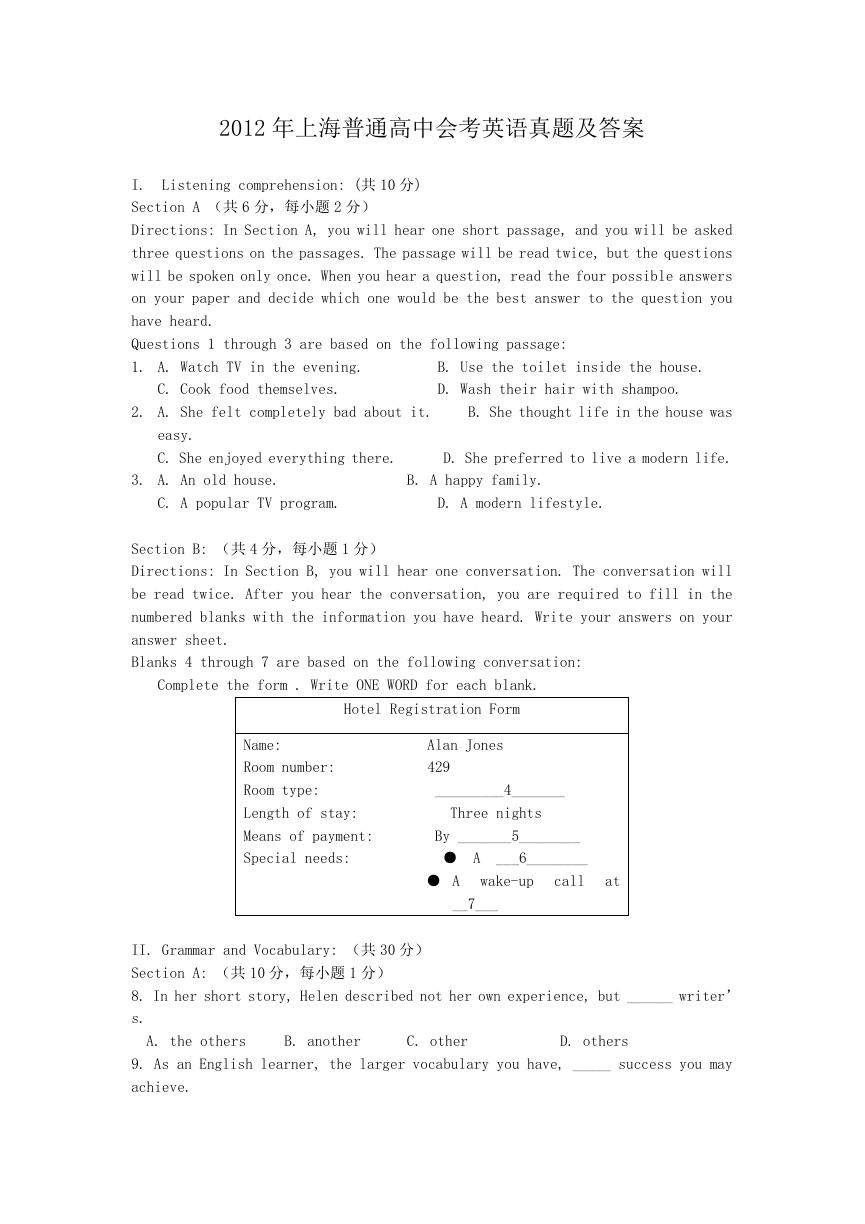
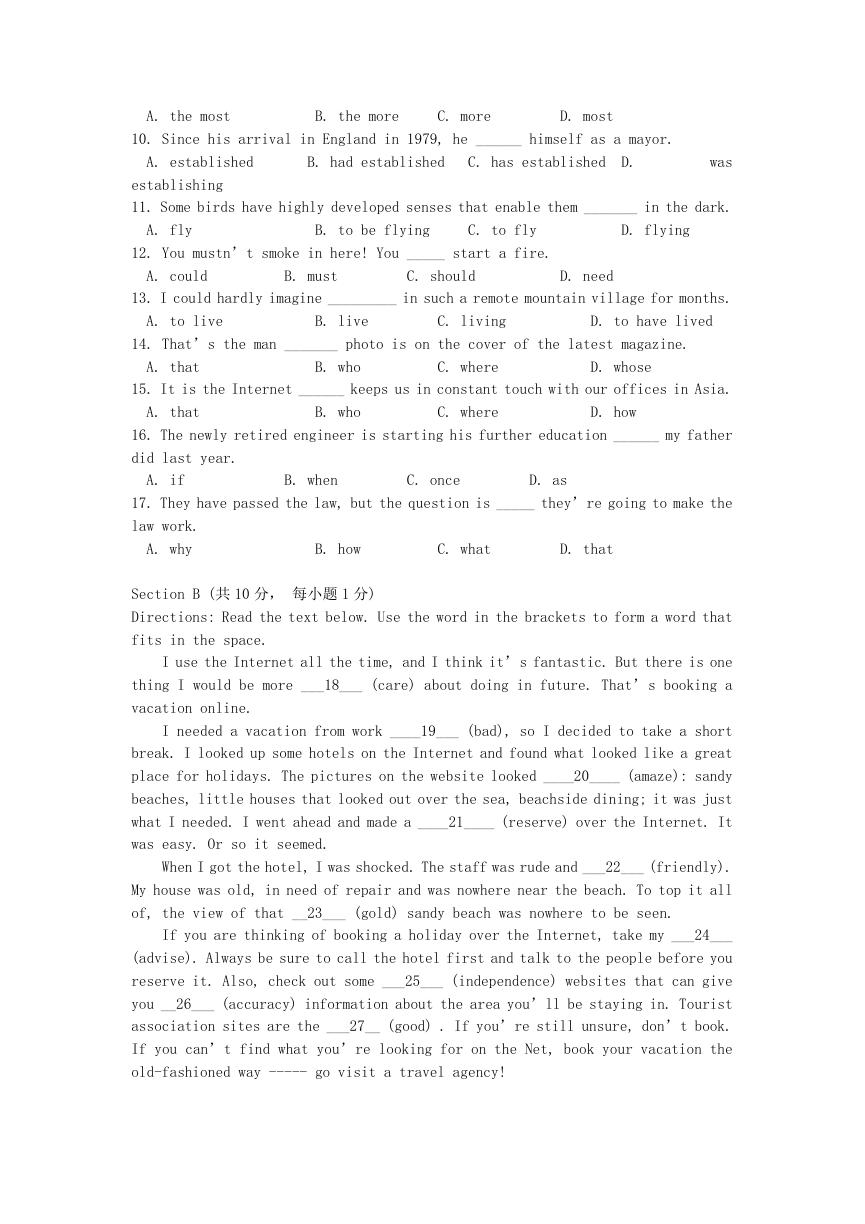
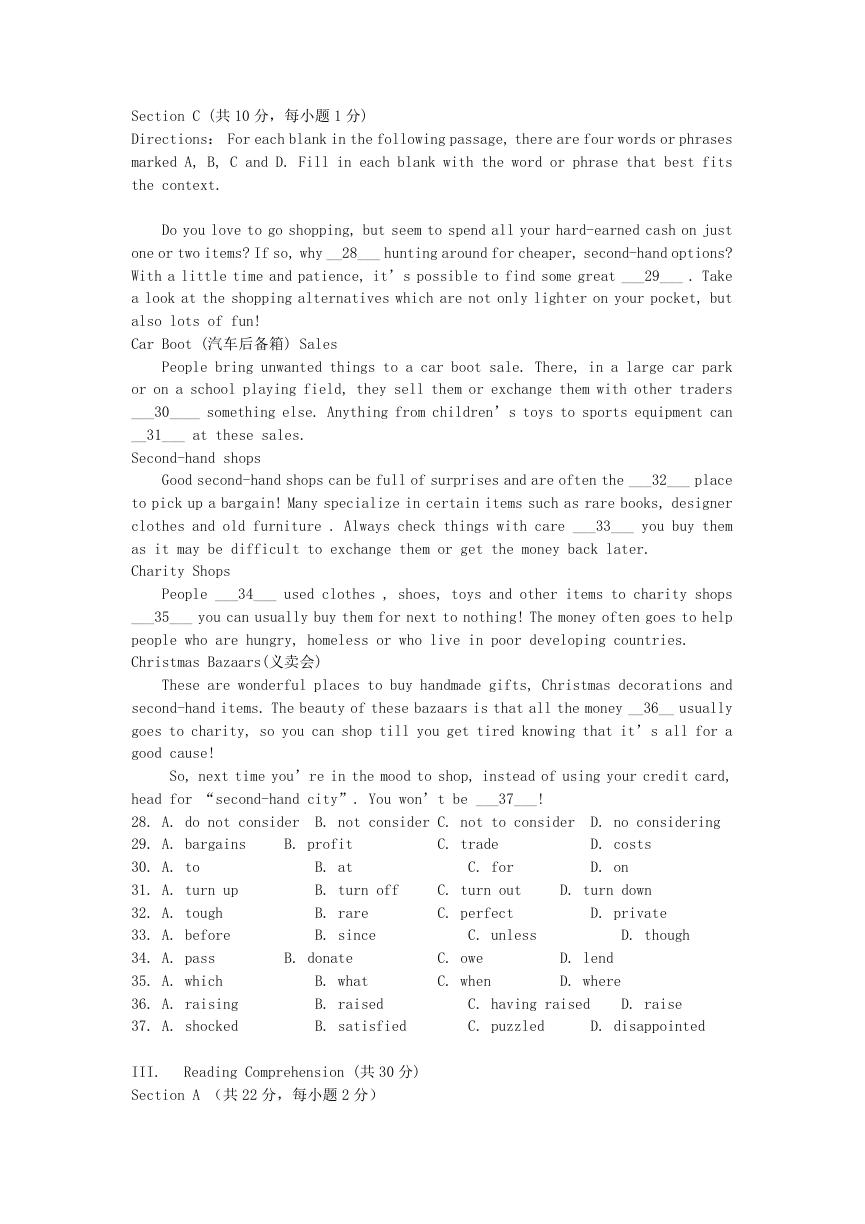
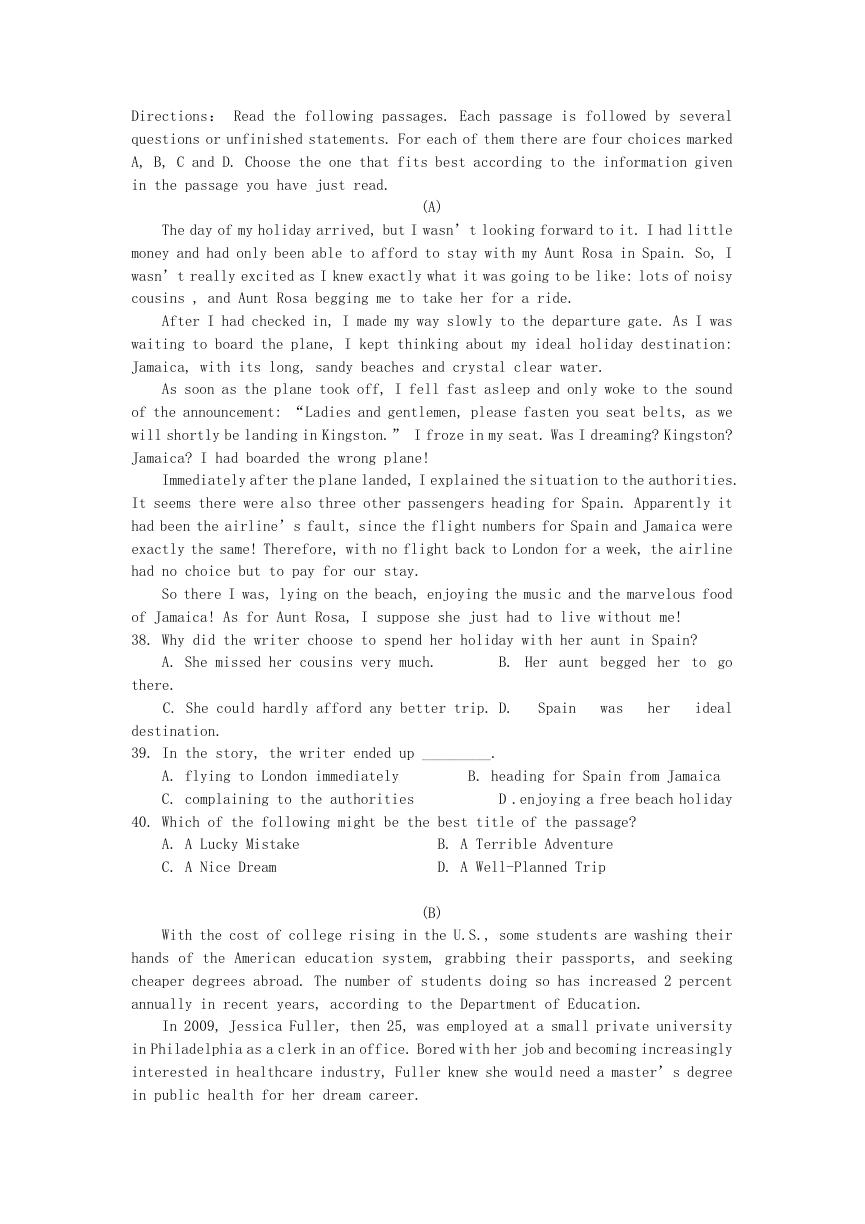

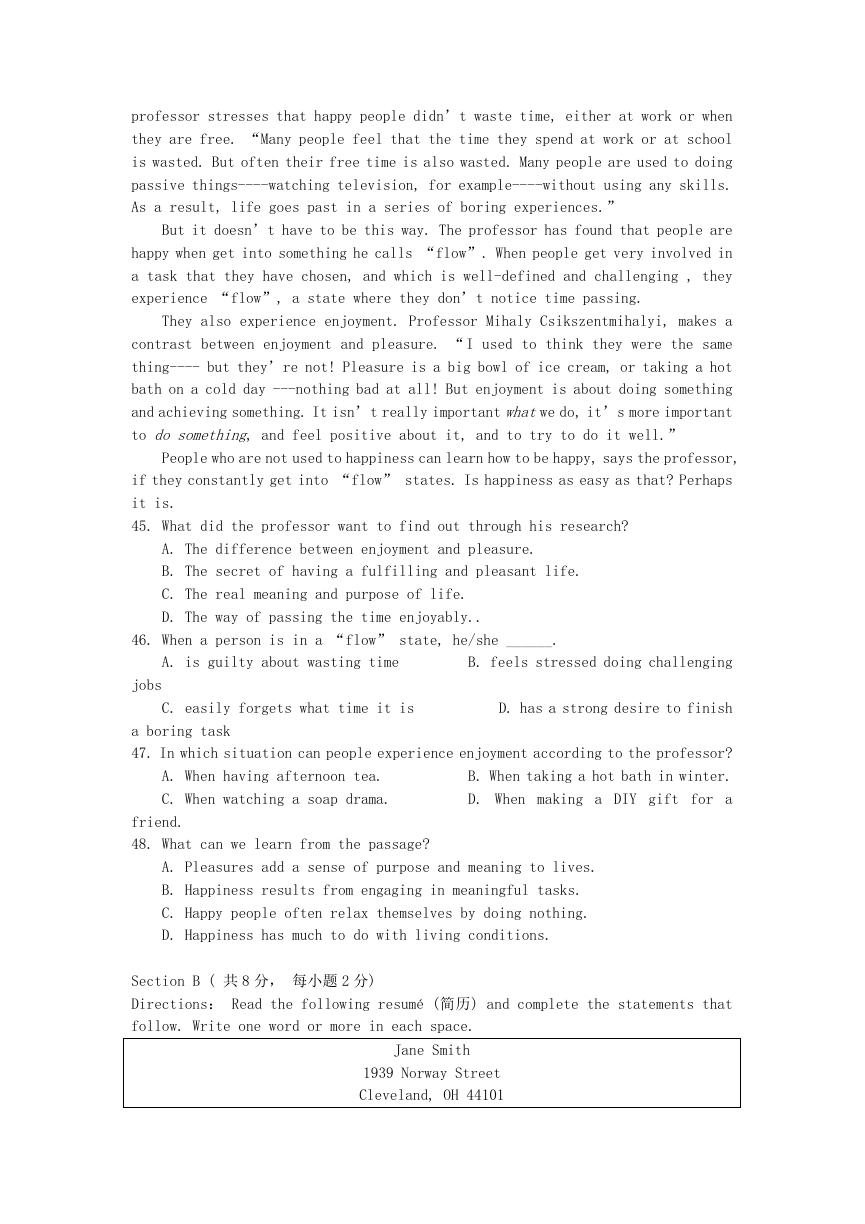
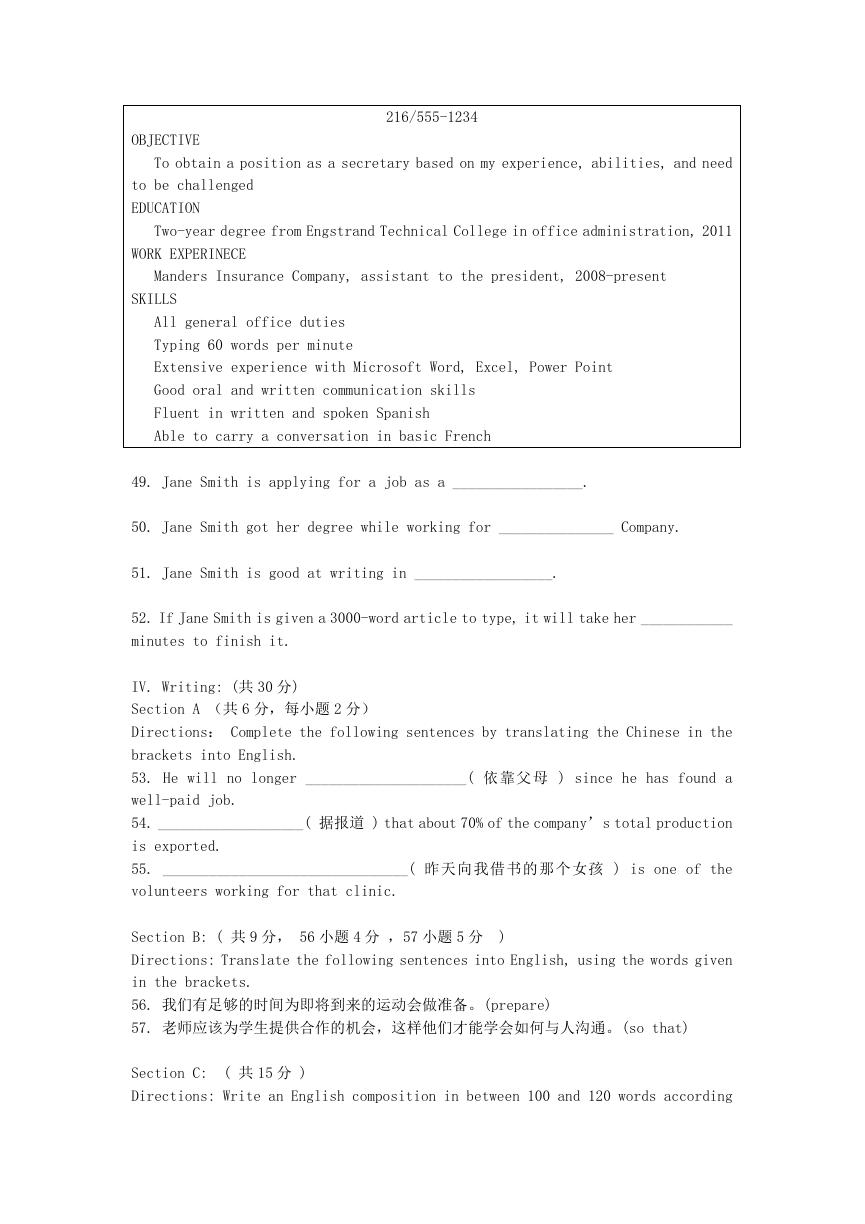
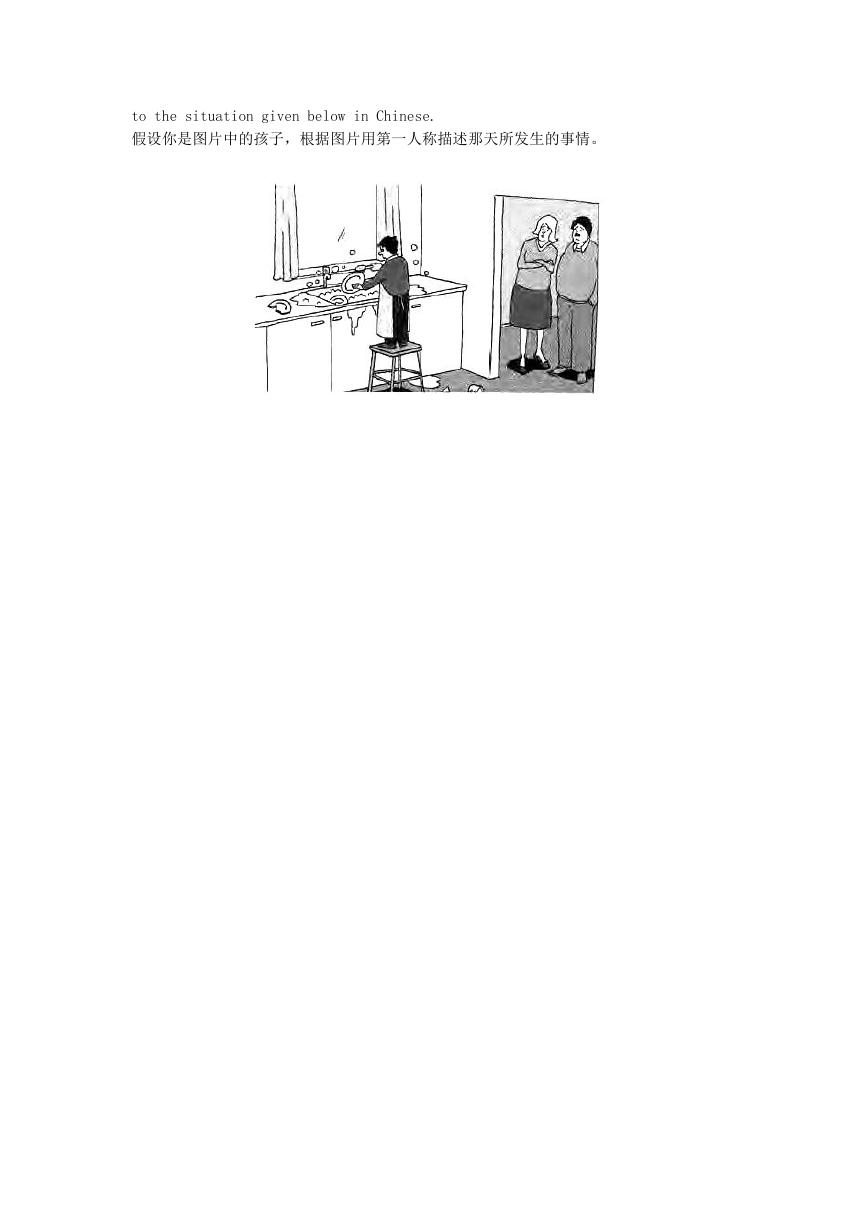








 2023年江西萍乡中考道德与法治真题及答案.doc
2023年江西萍乡中考道德与法治真题及答案.doc 2012年重庆南川中考生物真题及答案.doc
2012年重庆南川中考生物真题及答案.doc 2013年江西师范大学地理学综合及文艺理论基础考研真题.doc
2013年江西师范大学地理学综合及文艺理论基础考研真题.doc 2020年四川甘孜小升初语文真题及答案I卷.doc
2020年四川甘孜小升初语文真题及答案I卷.doc 2020年注册岩土工程师专业基础考试真题及答案.doc
2020年注册岩土工程师专业基础考试真题及答案.doc 2023-2024学年福建省厦门市九年级上学期数学月考试题及答案.doc
2023-2024学年福建省厦门市九年级上学期数学月考试题及答案.doc 2021-2022学年辽宁省沈阳市大东区九年级上学期语文期末试题及答案.doc
2021-2022学年辽宁省沈阳市大东区九年级上学期语文期末试题及答案.doc 2022-2023学年北京东城区初三第一学期物理期末试卷及答案.doc
2022-2023学年北京东城区初三第一学期物理期末试卷及答案.doc 2018上半年江西教师资格初中地理学科知识与教学能力真题及答案.doc
2018上半年江西教师资格初中地理学科知识与教学能力真题及答案.doc 2012年河北国家公务员申论考试真题及答案-省级.doc
2012年河北国家公务员申论考试真题及答案-省级.doc 2020-2021学年江苏省扬州市江都区邵樊片九年级上学期数学第一次质量检测试题及答案.doc
2020-2021学年江苏省扬州市江都区邵樊片九年级上学期数学第一次质量检测试题及答案.doc 2022下半年黑龙江教师资格证中学综合素质真题及答案.doc
2022下半年黑龙江教师资格证中学综合素质真题及答案.doc